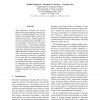2351 search results - page 260 / 471 » Tagging Human Knowledge |
COGSCI
2004
14 years 11 months ago
2004
In order to understand ongoing activity, observers segment it into meaningful temporal parts. Segmentation can be based on bottom-up processing of distinctive sensory characterist...
110
click to vote
ACL
2012
13 years 1 months ago
2012
Most information extraction (IE) systems identify facts that are explicitly stated in text. However, in natural language, some facts are implicit, and identifying them requires ‚Ä...
77
Voted
CHI
2009
ACM
15 years 11 months ago
2009
ACM
This paper investigates the role of online resources in problem solving. We look specifically at how programmers--an exemplar form of knowledge workers--opportunistically interlea...
BMCBI
2004
14 years 11 months ago
2004
Background: Short oligonucleotide arrays have several probes measuring the expression level of each target transcript. Therefore the selection of probes is a key component for the...
98
Voted
TASLP
2011
14 years 6 months ago
2011
‚ÄĒThis paper presents a novel student model intended to automate word-list-based reading assessments in a classroom setting, speciÔ¨Ācally for a student population that includes b...

